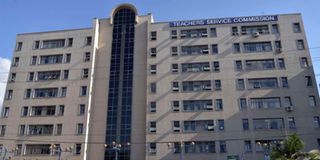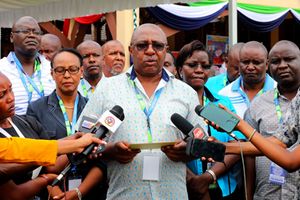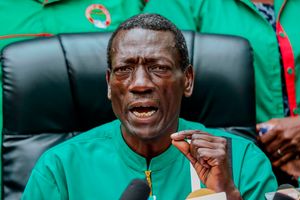
The Teachers Service Commission (TSC) headquarters in Upper Hill, Nairobi.
A seemingly forgotten lot of P1 teachers, who are trained to be deployed to primary schools, are hanging on to a ray of hope after President William Ruto requested they be patient with a promise that they will be employed by the Teachers Service Commission (TSC).
Dr Ruto said the government was working on a way out to employ the P1-trained teachers when the 24,000 vacancies for permanent and pensionable positions are advertised by the commission.
“I have heard of the tribulations that trained P1 teachers have undergone, and I am aware that a number of them are here among you in this meeting. Please, be patient, your issues are being sorted out,” Dr Ruto stated.
Speaking at Sogoo in Narok County last week during his two-day tour of the region, Dr Ruto stated that his administration had employed 76,000 teachers in a bid to ease the pressure on skewed pupil-teacher ratio in public schools.
The P1 teachers were trained for deployment in primary schools under the 8-4-4 system of education that is being phased out, and are said to be fit to impart knowledge on learners in Junior Schools as well, under the new system of education – Competency Based Education (CBE).
However, over the years, the absorption of the trained P1 teachers has been low, with some having graduated almost 20 years ago, yet to be employed, despite their advanced age.
The majority have lost hope of being employed by TSC and have since taken up jobs in private schools, engaged in business and farming, while others have explored opportunities outside the education sector.
Children of some of the teachers, who also trained as P1 teachers or university graduates (education), have been employed ahead of their parents, a pointer to the skewed deployment of policies by both TSC and the Ministry of Education.
In the 2025/2026 Financial Year’s budgetary estimates, the Teachers Service Commission (TSC) has been allocated Sh387.7 billion, which includes funds for employing new teachers.
National Assembly Parliamentary Committee on Education, chaired by Tinderet MP Julius Melly, has asked TSC to provide data on the number of trained and registered teachers above the age of 40 years.
It comes against the backdrop of rising claims of side-lining of those who have attained the age of 45 years during the annual recruitment by TSC.
In 2019, the Employment and Labour Relations Court ruled that it was discriminatory to lock out teachers from employment for the simple reason that they had attained 45 years, the old cut-off age for recruitment of public servants.
Though the high number of years one had been unemployed after graduation should play to their advantage during the recruitment by TSC that has not been the case, as those who are hardly six months out of college have been employed before them.
Cabinet Secretary for Education Julius Ogamba told Parliament that there are 343,485 trained but unemployed teachers in the country, opening the lid on the dire situation amidst shortages of tutors in primary, junior schools and secondary schools in the country.
Mr Ogamba indicated that there are 124,061 primary school teachers who have not been employed by TSC, with the number of teachers in public learning institutions said to be decreasing annually despite replacements.
Latest statistics from the Ministry of Education show that the number of teachers in primary school decreased to 212,602 in 2024, marking a decline of 3.2 per cent.
Dr Nancy Macharia, the TC Chief Executive Officer, told Parliament on April 8, 2025, that the country requires an additional 98,261 teachers, with the numbers expected to rise.
Annually, an overwhelming number of candidates apply for advertised vacant teaching positions in schools, with 314,117 having applied for 46,000 positions in October 2024, in a clear demonstration of the state of joblessness amidst teacher shortages in the learning institutions.
Dr Macharia, however, stated that there was a shortage of teachers to handle key subjects under CBE – including jewellery and ornament making, leather craft, sculpture, picture making, media technology, woodwork, marine technology, fisheries, indigenous languages and general sciences, among others.
Dr Macharia has separately stated that in 10 years she has been at the helm of the commission (2015-January 2025) - TSC registered 229,410 trained teachers in the country while the teacher establishment has grown by 101,000 during the period.
“The teacher establishment has grown in 10 years from 311,665 (in 2015) to 413,653 (in 2025” Dr Macharia stated.
“There has been a retooling of 229,000 primary schools and 55,125 of the expected Junior School teachers (comprising 91.7 per cent) to handle the CBE”, Dr Macharia has revealed.
Thousands of teachers who upgraded their training in line with the CBC system of education have not been absorbed by TSC, which has demoralised them and made others not follow suit in training.
Mr Malel Langat, the Kenya National Union of Teachers (KNUT) First National Vice Chairman, said while the promise by the President was welcome, it should be followed by action to clear the backlog once and for all.
“Sadly, and we hope the President has been rightly briefed on this matter, there are teachers who graduated in 2007, but have not been employed to date despite applying for the vacant positions for the last 18 years,” Mr Langat said.
“The P1 teachers are a jack of all trades as a result of their training background. They can handle learners in any education system,” he said.
“Much as they were not trained on Competency Based Education (CBC), their training was very wide and solid. All they require to fit into the new system is a bit of retooling, and they are good to go,” Mr Langat said.
“It is unfortunate that trained but unemployed teachers have seen their sons and daughters who recently graduated from colleges and universities being employed. The fact that they have to compete for the same positions with their children is heart-wrenching,” Mr Langat added.
The government has set aside Sh2.4 billion for the employment of 24,000 teachers in January 2026 in a bid to raise the number of those employed by the current administration to 100,000, which will be the highest record ever in three years.
The training of P1 teachers has been phased out with the Diploma in Primary Teacher Education and Diploma in Early Childhood Teacher Education Programmes having been merged, and in their place, the Diploma in Teacher Education has been introduced.
The minimum entry requirement for trainees in teacher colleges remains C- in the Kenya Certificate of Secondary Education (KCSE) examination.
Most of the changes being introduced to the education sector are due to the proposals by the Presidential Working Party on Education Reforms (PWPER), chaired by Professor Raphael Munavu, appointed on September 29, 2022.
The funding model for university education has since been changed, as has the model of education, from 8-4-4 to Competency-Based Curriculum (CBC) and lately Competency-Based Education (CBE).








